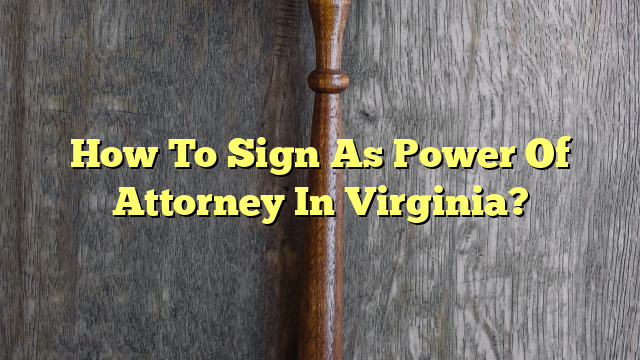| Table of Contents |
|---|
| What is Power of Attorney? |
| What Types of POA are There? |
| How to Sign as POA in Virginia |
| Witness and Notary Requirements in Virginia |
| Conclusion |
What is Power of Attorney?
Power of Attorney (POA) is a legal document that authorizes someone (the “agent”) to act on another person’s behalf (the “principal”). A POA can grant an agent authority to make financial decisions and legal decisions on behalf of the principal. The agent can be an individual, a business, or a non-profit organization.
POA documents are especially important when someone can no longer make decisions on their own behalf. For instance, POAs can be important if someone becomes incapacitated or is too ill to make decisions.
What Types of POA are There?
There are two types of POA documents: a general POA and a limited POA.
A general POA authorizes an agent to make decisions on behalf of the principal in any and all matters. This type of POA is typically used when the principal is unable to make decisions on their own due to illness or incapacity.
A limited POA, on the other hand, only authorizes the agent to make decisions in specific matters. This type of POA is often used when the principal is too busy to make decisions, or when the principal does not have the expertise to make a certain decision.
How to Sign as POA in Virginia
In Virginia, a POA document must be signed by the principal and the agent in the presence of a notary public. The document must then be notarized by the notary. The agent must also sign the document, either in the presence of the notary or in front of two witnesses.
If the POA document is to be used to write a check, the principal must also sign the check in the presence of the notary or two witnesses.
Witness and Notary Requirements in Virginia
In Virginia, POA documents must be witnessed by two individuals who are not related to the principal or the agent. The witnesses must be at least 18 years old and must understand what they are witnessing.
The POA document must also be notarized by a notary public. The notary must verify the identities of the principal and the agent, as well as the signatures of both parties.
Conclusion
Signing a Power of Attorney document in Virginia requires the principal and the agent to sign the document in the presence of a notary public, and the agent must also sign the document in the presence of two witnesses. Additionally, the document must be notarized by the notary in order for it to be valid. Finally, if the POA document is to be used for writing a check, the principal must also sign the check in the presence of the notary or two witnesses.
Does a Virginia power of attorney need to be witnessed?
Yes, in Virginia a power of attorney must be witnessed by two individuals who are not related to the principal or the agent.
Does a power of attorney need to be notarized in Virginia?
Yes, a power of attorney must be notarized in Virginia in order for it to be valid.
How do you write a check as POA?
If the POA document is to be used for writing a check, the principal must also sign the check in the presence of the notary or


Signing as power of attorney in Virginia can be a great way to help someone manage their affairs. Consider appointing a trustee too if possible.
This article is an essential guide for anyone signing as Power of Attorney in Virginia. Additionally, consider exploring online resources for making informed decisions.
A guide to signing as Power of Attorney in Virginia can be useful for anyone wanting to understand the process.
Power of Attorney in Virginia understood. Excellent guide! #VirginiaPoa